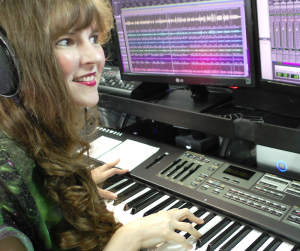
Featured Blog | This community-written post highlights the best of what the game industry has to offer. Read more like it on the Game Developer Blogs or learn how to Submit Your Own Blog Post
Under the Covers: Why Game Melodies Won’t Let Go
This excerpt from my book A Composer's Guide to Game Music, published this month by The MIT Press, explores some of the powerful psychological effects of hearing music during gameplay.

The following is an excerpt from my book, A Composer's Guide to Game Music, published this month by The MIT Press. Copyright 2014, Massachusetts Institute of Technology. All rights reserved. The book is available at Amazon, Barnes & Noble, and wherever books are sold.
Under the Covers: Why Game Melodies Won’t Let Go

Every year, thousands of American gamers gather together to attend two major conventions: the Penny Arcade Expo in Seattle, Washington (otherwise known as PAX) and the Music and Games Festival (a.k.a. MAGfest) in National Harbor, Maryland. Crowds of enthusiasts pack exhibit halls, challenge each other in all manner of games from console to PC to tabletop, celebrate their love of geek culture, and party into the wee hours. They also attend officially sponsored rock concerts.
The venues are often packed with sweaty music-lovers, many wearing the usual jet-black of devout rockers (although some of these black t-shirts also feature video game logos). The audience whoops, throws their hands up in the sign of the horns, and jumps and thrashes in the true tradition of a mosh pit. The music at these concerts tends to favor heavy metal, although rap occasionally makes an appearance, and even some softer acoustic ensembles and funky jazz groups have been included. The headliners at these concerts aren’t big names. They’re mostly cover bands, but high-energy performances over the years have earned them a devoted following. In fact, these rock concerts resemble many that you might find anywhere in mainstream America, barring one exception.
“Encore! Encore! Encore!” shouts the crowd. The band has already finished their set. The stage is dark, but the audience still isn’t satisfied. “Encore! Encore!” continues the chant, relentlessly. At length, the band returns to the stage, setting up for the demanded encore while the audience loudly revels in its success. The first notes of the encore performance are sounded, and someone in the crowd can be heard screaming, “Yes! Oh my God, yes! Yeah!!! Woo!!” The screen behind the band lights up to show the logo of the video game Diablo III.
This is a game music cover band. In fact, all the bands on the playlist are game music cover bands. The band currently performing the “Tristam Theme” from the Diablo series is called the OneUps, and they’ve played the PAX stage before. Video game cover bands like Powerglove, the Earthbound Papas, the Minibosses, and the Advantage are all veterans of the big shows like PAX and MAGfest, as well as some of the smaller shows (such as Nerdapalooza in Orlando, Florida, DEF-CON in Las Vegas, Nevada, and Bit Gen Gamer Fest in Baltimore, Maryland). Each band uses its unique sense of performance style to interpret the musical themes from beloved game series like MegaMan, Metroid, Castlevania, Ninja Gaiden, and Final Fantasy. Even the Russian folk-inspired music of Tetris has received heavy metal cover-song treatments. Moreover, game music cover performances aren’t limited to just the gaming conventions. Relatively mainstream rock acts will occasionally record a cover version of a game track, such as when the Pixies recorded Brian Schmidt’s theme song from the NARC video game (Audio Spotlight 2012). Still, the hardcore game music cover bands remain the driving force behind the movement. Every year, new bands join the veterans on the concert lineups. Each new band adds its own game music interpretations to the many others that have been performed and will continue to be revamped and reimagined year after year.
Why do these rock bands continually celebrate video game melodies? Film and television music can point to no similar phenomenon. Although film and tv music certainly can boast of its enthusiastic fans, cover bands like these are unique to the video game community. Why is it that these bands triumphantly perform the melodies of video games, like rock anthems for a geek generation? Why do audiences return again and again to hear the same video game tunes interpreted in different ways?
We know that a musical theme expressed within the body of a video game is experienced differently than themes in passive forms of entertainment, like television and film. In a game, a musical theme accompanies an activity that the players of the game are performing. The music has essentially become the soundtrack to the personal adventures of the players. When the music swells at a pivotal moment and a recognizable melody begins, the players hear that melody just as they are engaging in an activity they enjoy. This interactive engagement alters the way in which the music is heard and remembered. According to an article for Topics in Cognitive Science written by Michelene Chi (2008), psychology professor at Arizona State University, our ability to retain experiences, process information, and successfully learn new things is directly impacted by how engaged we are at the time—therefore, interactive experiences are better than passive ones. So, does listening to a melody while actively playing a game cause us to internalize that melody more readily than hearing it while passively watching a film or television program? Is this why people develop such intense feelings about their favorite video game melodies?
Game music, like other forms of popular music, is experienced frequently while the listener is also doing something else. According to research conducted at the University of Geneva, the power of music to rekindle memories of emotional experiences from the past is due particularly to the pervasive nature of music in social life and during special activities (Scherer and Zentner 2001). Because music often becomes connected with the memory of an activity, it also acquires special significance and personal associations. For instance, a popular love song can instantly bring back memories of a first date, a rock anthem can reignite the memory of winning a particular sporting event, and a video game melody can bring back the memory of defeating a powerful boss. This may be the reason why game music cover bands exist. The relationship people experience with game music shares common ground with the place that popular music occupies in their lives. Both forms of music serve as the soundtrack to significant personal actions, and hearing the music associated with those actions has the strong potential to bring back vivid memories. Game melodies may in fact function as mnemonic ambassadors for the games from which they come, reminding players vividly of the fun they had while playing.
My book, A Composer's Guide to Game Music, explores the art of video game music from the viewpoint of a game composer, offfering guidance for musicians and composers who want to deploy their musical creativity in a dynamic and growing industry. The book is available at Amazon, Barnes & Noble, and wherever books are sold. I have composed the music for such video games as Assassin's Creed Liberation, The Da Vinci Code, Speed Racer, God of War, Shrek the Third, Spore Hero, multiple games in the LittleBigPlanet franchise, and many others.
Notes:
Audio Spotlight, The. 2012. “Brian Schmidt Interview.” The Audio Spotlight. Accessed February 2, 2013. http://theaudiospotlight.com/in-the-spotlight/composers/brian-schmidt-interview/.
Chi, Michelene T.H. 2008. Active-Constructive-Interactive: A Conceptual Framework for Differentiating Learning Activities. Topics in Cognitive Science 1:73–105.
Scherer, Klaus R., and Marcel R. Zentner. 2001. Emotional Effects of Music: Production
Rules. In Music and Emotion: Theory and Research, ed. P. N. Juslin and J. A. Sloboda, 361–392. New York: Oxford University Press.
 Winifred Phillips is an award-winning video game music composer whose most recent project is the triple-A first person shooter Homefront: The Revolution. Her other credits include five of the most famous and popular franchises in video gaming: Assassin’s Creed, LittleBigPlanet, Total War, God of War, and The Sims. She is the author of the award-winning bestseller A COMPOSER'S GUIDE TO GAME MUSIC, published by the Massachusetts Institute of Technology Press. As a VR game music expert, she writes frequently on the future of music in virtual reality video games. Follow her on Twitter @winphillips.
Winifred Phillips is an award-winning video game music composer whose most recent project is the triple-A first person shooter Homefront: The Revolution. Her other credits include five of the most famous and popular franchises in video gaming: Assassin’s Creed, LittleBigPlanet, Total War, God of War, and The Sims. She is the author of the award-winning bestseller A COMPOSER'S GUIDE TO GAME MUSIC, published by the Massachusetts Institute of Technology Press. As a VR game music expert, she writes frequently on the future of music in virtual reality video games. Follow her on Twitter @winphillips.
Read more about:
Featured BlogsAbout the Author(s)
You May Also Like







.jpeg?width=700&auto=webp&quality=80&disable=upscale)








